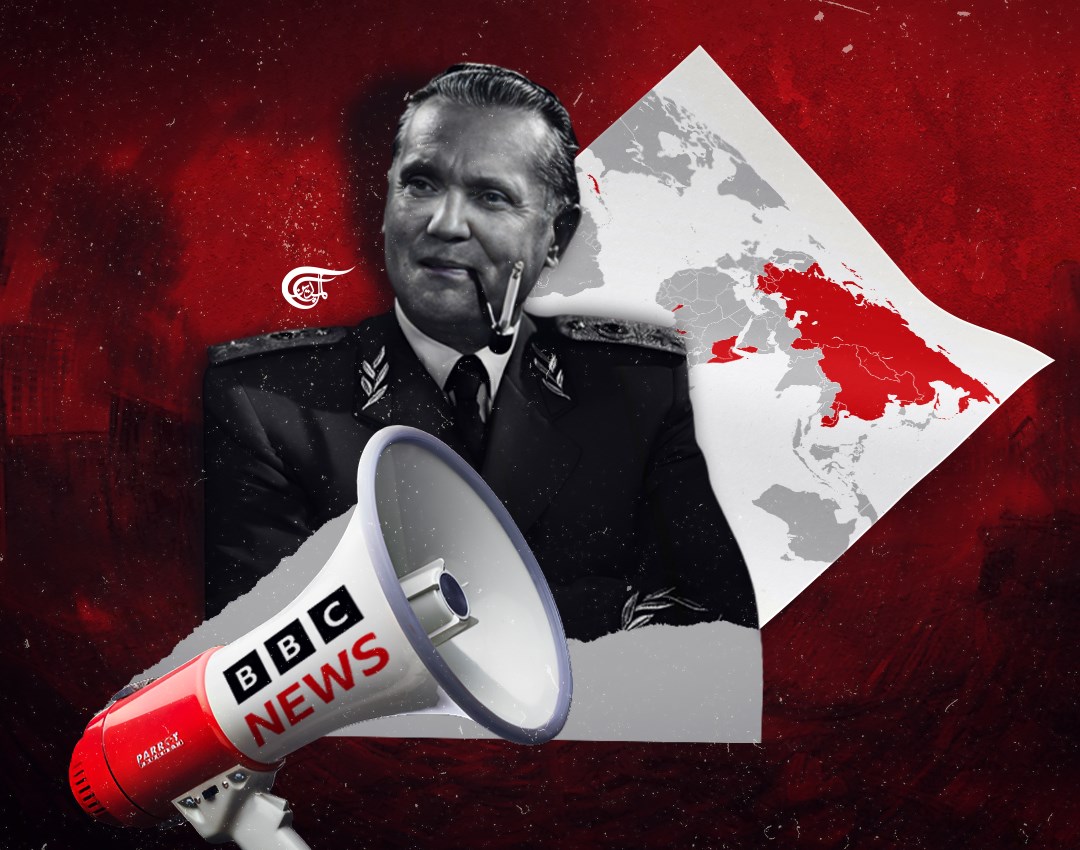Declassified: Yugoslavia’s ‘propaganda value’ for British spies
Yugoslavia, before it was destroyed by NATO, had immense propaganda value for the MI6's IRD, which wanted to use the country as part of their propaganda campaign to deter countries from the Soviet model.
-

The British actively encouraged “increased contact between Yugoslavia and the uncommitted countries,” both overtly and covertly
Declassified files shed fascinating light on how during the Cold War, Yugoslavia was a subject of intense cloak-and-dagger interest to British intelligence propagandists within the Information Research Department (IRD).
IRD was a domestic and foreign psychological warfare unit staffed by diplomats, information operation specialists, and spies founded in 1948. Its mission was to spread a “ceaseless” deluge of “outright lies and distorted facts” among journalists working at major news outlets, “as well as every other available channel,” to discredit Britain’s enemies at home and abroad. These activities extended to regime change, and fomenting mass murder.
Cold War-era Yugoslavia was not a country global capitalism would typically countenance. A non-aligned, formally Communist confederation comprised of multiple religions and ethnicities, where intermarriage and multiculturalism were actively encouraged by the state, whose mixed market-socialist economy was, for the most part, a success, and where living standards were high for all. Education, healthcare, housing, income, one month’s paid vacation every year, and much more besides, were all considered human rights, which the entire population enjoyed by law.
The US Empire - temporarily and begrudgingly - not only tolerated all this, but granted Yugoslavia enormous indulgences, including sizable aid and preferential treatment in trade. The reason was simple - Belgrade’s repudiation of the Soviet Union, and its fruitful alternative economic and political model, was enormously useful geopolitically.
The declassified files starkly outline how British intelligence sought to harness that utility. Several documents openly discuss Yugoslavia’s “propaganda value” - how particular aspects of its economic and political system could be presented to audiences in the Eastern Bloc and Global South, to discredit the Soviet Union, and prevent the spread of Communism.
The cache offers highly illuminating insight into how British spies constructed and disseminated propaganda campaigns during the Cold War, with obvious relevance to the present day. For example, at one stage, the BBC is axiomatically described as one of many “organs of publicity” that British intelligence “control or influence.”
‘An Unmixed Blessing’
The paper trail begins in September 1960. A file notes that IRD’s “past practice has been to leave Yugoslavia severely alone - neither using its bad points…to show the oppressive nature of Communism, or its good features such as the freer economy, to show the advantage of divergence from the Soviet pattern.” However, recent developments had spurred a reconsideration within the Department.
At this time, traditional Western empires were rapidly approaching extinction the world over, and many ascendant anti-colonial movements looked to the Soviet Union for support and guidance. To say the least, British intelligence had a keen interest in deterring these soon-to-be nations from embracing Communism of the Muscovite variety, and Yugoslavia provided an ideal alternative model to present. The country’s successes could also stoke anti-Soviet sentiment in Moscow’s Warsaw Pact satellite states.
Many of the files detail extensive back-and–forth internal discussions on “the question of whether Yugoslavia should be used in IRD material,” and if so, how? One British spy suggested a “country by country” approach was appropriate:
“I could imagine that in a country such as Guinea, which is already to some extent under Communist influence, the considerations would be different from somewhere like the Congo, where it’s anyone’s guess what type of government will eventually emerge.”
Another concurred, stating there was “considerable advantage” to giving “as wide publicity as possible” to Yugoslavia’s “freer economic organisation over the methods of [Eastern] Bloc regimes.” They suggested IRD prepare “comparative studies” to inform the output of the BBC’s East European Services accordingly:
“Continuing Yugoslav economic success - particularly in agriculture - is a theme which should be given greater play in countries behind the Iron Curtain. The aim would be to show that Yugoslavia, by adopting an agricultural system which was politically and economically heretical and which has been violently criticised in the Soviet Bloc, has increased agricultural productivity far faster than any other Communist country…Russia and the satellites have gone to very great lengths to suppress this information in their own countries.”
There was nonetheless hesitancy among British spies about promoting Yugoslavia’s accomplishments. Doing so ran the risk of actively promoting Communism, which they were determined to destroy. One official warned:
“There may be much to be said for educating listeners in satellite countries about a country which has successfully won and preserved its independence from the Russians. It would, however, be wise for the present, to dwell on the economic achievements and to tread warily in dealing with the political organisation of a state which is still both Marxist and authoritarian.”
Another cautioned that while Yugoslav leader Josip Broz Tito’s tour of non-aligned African and Asian countries in 1958 had pleasingly proven “obnoxious to the Russians,” such activities were not “an unmixed blessing for the West.” The official feared governments in those regions “might be tempted by Yugoslav experience to draw the fallacious conclusion it is possible to flirt with Communism without much risk of compromising themselves with Moscow or Peking.”
‘More Anti-Colonialist’
Yet, the biggest source of internal resistance was precisely what had compelled IRD to “leave Yugoslavia severely alone” in the first place. As one file explains:
“The main reason for not drawing attention to Yugoslav achievements to audiences within the [Eastern] Bloc was that it laid Yugoslavia open to the accusation of being dependent on American grain imports for survival and therefore being a ‘lackey of American imperialism’.”
As such, “undiluted praise” of Belgrade issuing from the BBC or other IRD propaganda conduits risked “[lending] credence to the Soviet thesis that Yugoslavia is a ‘puppet of the West’.” British intelligence was keen to avoid validating this narrative, as the country’s “anti-colonialist” image on the international stage was “advantageous” to London:
“In special cases, where Yugoslavia’s interests coincide with our own and she can be persuaded to take action, she may indeed be better placed to plead a cause than we are ourselves. For example, we hope that she may exert her influence for the good on the relations between Egypt and Iraq.”
The British actively encouraged “increased contact between Yugoslavia and the uncommitted countries,” both overtly and covertly as a result. This was despite, as an official bitterly recorded, Tito presenting his country to Africans “as staunch anti-colonialists and not as anti-Stalinists” on his 1958 tour, and spending “much more time doing us harm in the former capacity than good in the latter.”
Such “harm” was nonetheless worth suffering for British intelligence overall, due to Yugoslavia’s “defiance to Russian imperialism,” the “corrosive effect which her ideas and practices have had upon Marxist doctrine,” and the “influence which she is increasingly coming to exert upon those who are not themselves Marxists and who lie outside the two Great Power systems.” Belgrade’s intermittent criticism of the Cominform, and the Chinese and Soviet governments, was an added bonus.
So it was that IRD decided against “projecting Yugoslavia’s achievements outside the Soviet Bloc.” It was not judged sensible to act as “apologists” for Tito’s government, “when the image she will project will be more anti-colonialist than anti-Soviet-Bloc-Communist.” Conversely, it was believed “very considerable advantage” could be gained from doing so behind the Iron Curtain, “as a very carefully planned operation” employing “great discretion.”
The operation entailed “small scale publicity campaigns rather than giving general directives to the various organs of publicity which we can control or influence.” IRD operatives ruled that positive media reports about Yugoslavia were “far more likely to be believed” in Eastern Europe “if carried by the BBC in the odd unemphasised news item and an occasional talk.” Should a particular propaganda narrative prove especially effective in the Soviet sphere, it might be considered “appropriate for cautious use elsewhere.”
‘Political and Economic Reform’
IRD’s determination to conceal Yugoslavia’s foreign backing from audiences in emergent Global South countries during this period had a concomitant benefit. Namely, by extolling the virtues of Belgrade’s “alternative” economic system, and framing it as wholly autonomous from both Washington and Moscow, governments adopting the same approach would not be cognizant that at any point in future, the US Empire could choose to pull the rug out from under them in spectacular fashion.
This is precisely what happened in Yugoslavia. During the 1960s and 70s, Belgrade borrowed heavily from Western countries to expand its industrial base, export production, and output of domestic consumer goods. In 1980 though, those creditors - including the International Monetary Fund (IMF) and World Bank - demanded this be repaid, and applied crippling, ever-escalating interest on the sum owed. Unable to repay, Belgrade agreed to a “restructuring” of its ballooning debt.
Under its terms, the IMF and World Bank imposed a brutal neoliberal “austerity” program on Yugoslavia. Wages were frozen, state-subsidy of essential goods was abolished, social spending was savagely cut, dozens of worker-owned enterprises were forced into bankruptcy, hundreds of thousands of employees laid off, and tens of thousands forced to become guest workers in Europe. All to service the enormous debt interest dumped on the country from abroad.
This culminated in November 1990, when under direct pressure from the Bush administration, US Congress passed the 1991 Foreign Operations Appropriations Act. The legislation cut off Yugoslavia from all US aid and credit in global financial markets, while obligating its republics to declare independence and hold elections under State Department observation within six months. Only once the republics were ‘free’, and right-wing, neoliberal parties supported by Washington voted in, would Western support resume.
As the US, Britain and West Germany had both openly and secretly throughout the 1980s sponsored and promoted nationalist, separatist elements in Yugoslavia in service of the country’s breakup, compliance was largely assured across the federation. The one exception was Serbia, which had consistently rejected the IMF and World Bank-foisted austerity measures. Despite being destructively sanctioned throughout the 1990s, which at one point produced hyperinflation in the quintrillions, Belgrade stubbornly refused to capitulate to the demands of global capital.
Come 1999, over three-quarters of Yugoslav industry remained worker-owned, and protected by the state. The 1998/9 Kosovo Crisis, during which Belgrade fought a heavy-handed counterinsurgency campaign against CIA and MI6-funded and armed jihadist outfit the Kosovo Liberation Army, provided the Clinton administration with a compelling pretext to enforce neoliberalism on Yugoslavia through mass aerial destruction, under the aegis of “humanitarian intervention.”
NATO took direct orders from major US corporations on which industrial sites to strike during the 78-day-long bombing campaign, then bought up Yugoslavia’s economy for a pittance once it was over. US officials central to the campaign’s orchestration and execution also personally profited from the resultant privatization in Kosovo and Serbia. As Strobe Talbott, Deputy Secretary of State under Clinton and leading US negotiator during the war, explained in 2005:
“It was Yugoslavia's resistance to the broader trends of political and economic reform - not the plight of Kosovar Albanians - that best explains NATO’s war.”

 Kit Klarenberg
Kit Klarenberg
 11 Min Read
11 Min Read











